An African lifestyle brand empowering communities through fashion and education
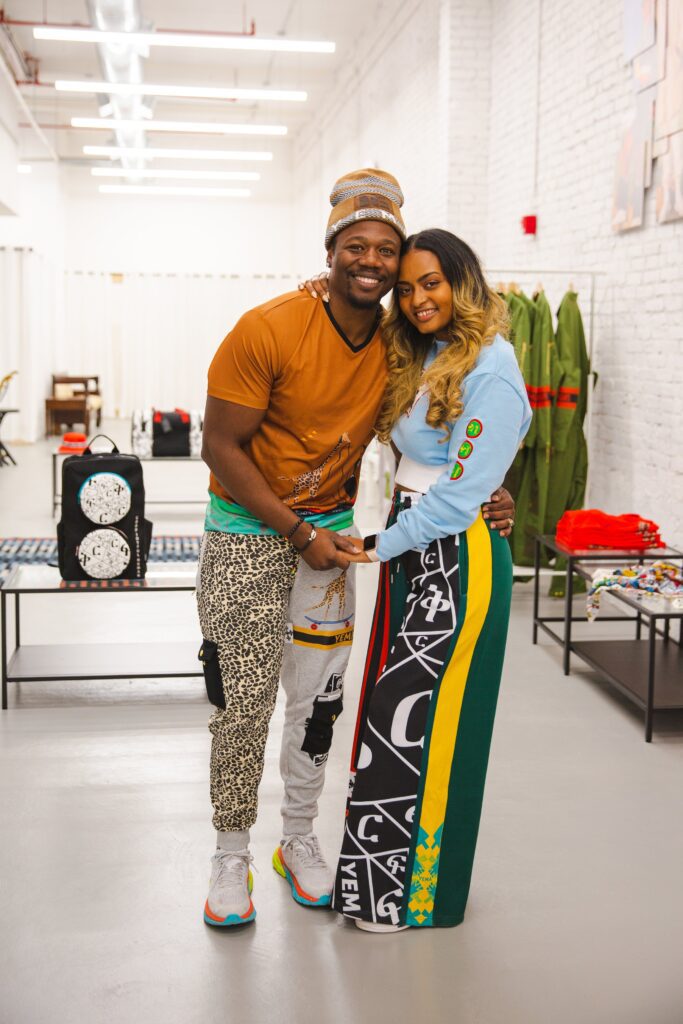
Meet Hawi Awash and Yema Khalif, co-owners of YEMA, a high-end urban streetwear fashion brand located in Tiburon, California. The story of how they met and created YEMA is as powerful and as colorful as their clothing brand. Awash invited us to her shop in Marin County, right over the Golden Gate Bridge from San Francisco. Between serving customers and tending to her two young children, we spent an hour discussing how she emigrated from a refugee camp in Kenya to the U.S., started YEMA after meeting her future partner at Dominican University in San Rafael, CA, and also how a portion of YEMA’s profits goes toward promoting education for kids in Africa.
HL: What were the first few years like when you immigrated to the U.S.?
Hawi Awash: In Kenya, I was a child and a refugee from Ethiopia. I would see kids going to school and living their best life and speaking English and doing all of these great things. I could not participate at all because I didn’t have any kind of proper documentation that would allow me to go to school. Until I came to the states, I didn’t have any formal education. So, I wasn’t able to go to school. I didn’t do pre-K. I didn’t do kindergarten, first grade, second grade. My first introduction to school was in fourth grade at eight years old in Minnesota.
In terms of Minnesota itself, there was a huge weather change. Kenya is more tropical, just like Ethiopia. Very nice weather. Minnesota has four seasons that are extremely intense, which was very different. Also, I had to learn a third language. I originally spoke Amharic fluently. Then I went to Kenya and had to learn Swahili. Now in the U.S., I had to learn a whole new language. So, there’s definitely that whole transition.
HL: Were you always in love with fashion?
HA: I loved dressing up and I loved looking really good. I think it’s a little African to do that—your clothes really define you. When I was 13, I came to Los Angeles to do a casting call for this agency, and I kind of discovered California. I got to go make a living there. So, when it was time to go to college, I said, “I’m going to California.” And when I was looking at business in college, fashion made sense.
HL: How did YEMA start?
HA: My husband and I started YEMA before we got married. YEMA was founded in 2016, then we got married in 2017 and I moved to Tiburon. It began as an athletic wear line, so we did sports bras and leggings then transitioned into a streetwear line in 2019. And that’s kind of when we went full-on. We made the brand what it is now and focused more on Ethiopian and Kenyan lineages and more streetwear. In February 2020, we opened the store in downtown Tiburon a month before the pandemic hit.
HL: How did you and your husband, Yema, end up in Tiburon?
HA: Yema was already in Tiburon. His story is so cool. Yema was born and raised in Kibera, which is the second largest slum in the world. The people there make less than a dollar a day. He comes from a family of seven kids, so he wasn’t able to go to school straight through like many of us. His parents would have to choose between him and his siblings as who would go to school. So, even though he performed really well, they didn’t have the financial ability to send all of them to school the same time. He would take a turn then he would take a break for the next two years. Once he finished high school, his mom didn’t have the financial ability to support his college education. So, he volunteered through different organizations that would provide certificate programs. For a while he did some acting and got cast for a job where he met an actress by the name of Connie Nielsen. She saw his creativity and just how brilliant his mind was and thought, “Oh my God, you need to go back to school, and you need to get a college education.” Connie decided to foster him and bring him to the states in order to do that. So that’s kind of how he ended up here, and that’s how he was able to get a scholarship to Dominican to do his undergrad, then his MBA.
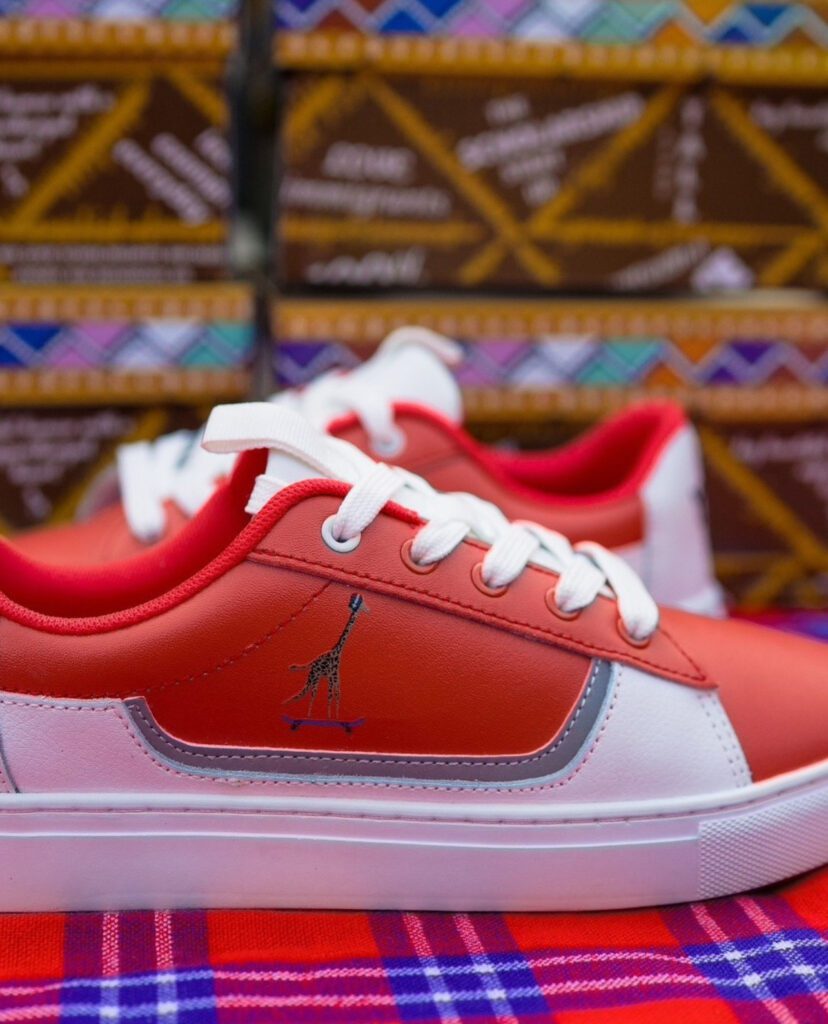
HL: The logo for the YEMA brand is a giraffe. Why?
HA: A giraffe is a distinctively African animal. It also has the biggest heart of all land mammals. At the core of our brand, the way that we’ve built it, we’ve been given so much opportunity. We want to make sure that we pay it forward by giving to kids who are in similar situations as we were: kids growing up in Kibera, kids who are refugees, kids who are orphans, and others in that kind of situation. We put 20 percent of our proceeds toward that cause, and we provide education to kids in both Ethiopia and Kenya. In doing that, we’re building a brand that has a big heart. And the giraffe is a great representation of that big heart.
HL: What is fashion for you? How would you define that?
HA: Fashion for me is self-expression. And I also feel like it’s more than just clothes, right? In a way it’s a part of you. Social impact is a huge part of me. So, when I participate in creating a piece of a garment, I’m very conscious about the social impact that it’s creating. When I am wearing that garment, I’m very conscious about it. Who is making this? How is it made? What is the purpose? Does it mean something? Is it giving back? So, all of those different elements. I do feel like fashion is all of those things.
HL: Where do you draw inspiration for your pieces?
HA: We draw a lot of our inspiration from 16th century Ethiopia, a golden age, an era of elegance and equality. You know, equality in the sense of peace, harmony, respect, honor. All of those different things where men and women can both be royals, where men and women can both have significant roles in shaping a society. So, we draw a lot of inspiration from that era for that reason.
HL: Tiburon is maturing when it comes to diversification. What has it been like opening up a business in town?
HA: As a couple, Yema and I are here. We are very conscious of the community and where we chose to establish a store. We wanted established our store in Tiburon, in part so kids can look up to us and say it could be done. You could be a Black designer. You could be a Black entrepreneur. You can break boundaries. You can go into sectors where you are not typically seen, where you are not typically welcomed into, and you can rewrite history. We are very conscious of that, and we’ve tried to highlight that. And we have definitely faced a lot of challenges in terms of not feeling welcomed. People, when we first opened, would come in and they would say, “This is so colorful. Why would you have a store here?” As if it doesn’t belong, right? There’s just a lot of opinions and dialogues we’ve had that have been uncomfortable and have definitely made us feel like we are not supposed to be here. That has definitely been a challenge, but I do I do feel like we are making an impact, and I think that is always important to be to be an example for folks to know that it could be done.
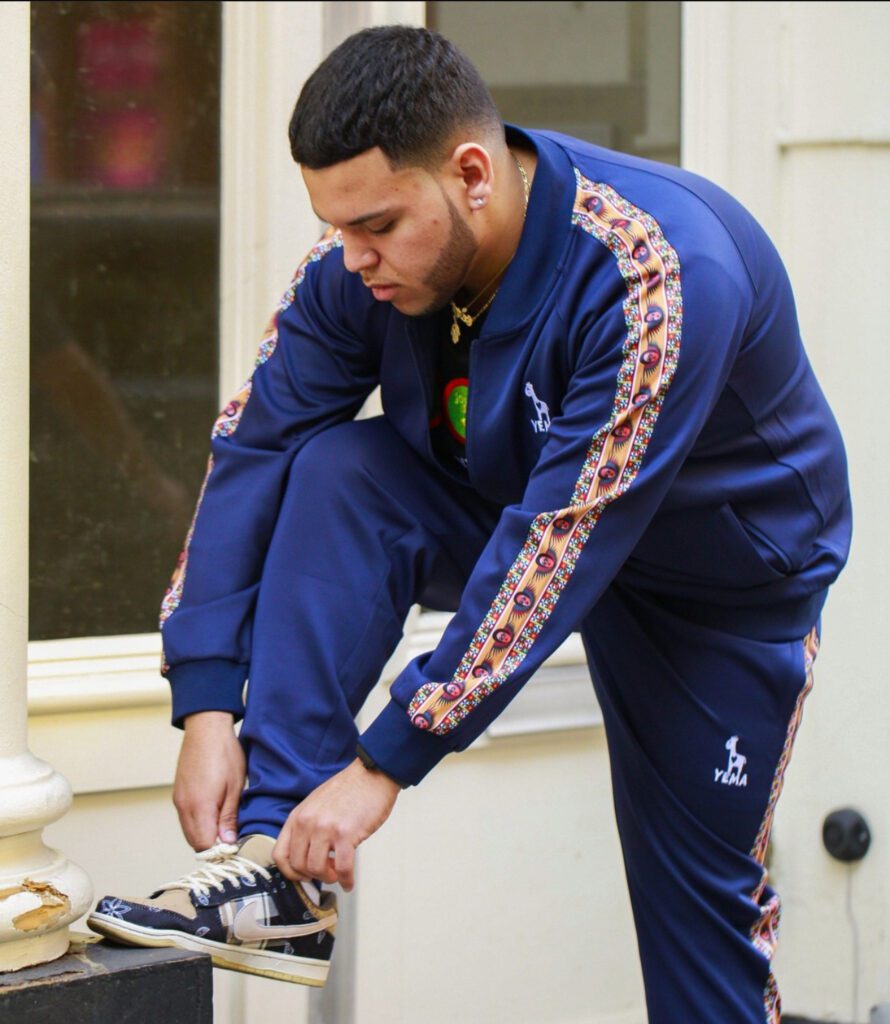
HL: Do you use sustainable materials or eco-friendly practices in your designs?
HA: Yeah, absolutely. We use a lot of bamboo fabric, so that’s definitely sustainable. And we do try to make sure that we’re practicing eco-friendly systems. Social impact is kind of at the center of what we do. So, we’re very conscious about how things are made, what is used, who’s making it, are they being paid correctly, and all of those things.
HL: Define for us your personal style. What’s your style? Has it changed after children?
HA: That’s a very good question. My personal style is elegant, yet comfortable. I’m very big on comfort, but I also really like looking good. I love looking put-together, you know? I didn’t mind things being tightly fitting previously; however, after children, I want to be more comfortable. You’ll definitely be seeing a lot looser fitting clothes in the coming year for sure.
HL: Describe your design aesthetic in three words.
HA: Chic, unique, and beauty.
HL: How do you stay updated on the latest fashion trends and industry news?
HA: Oh my God, we are huge followers of Vogue Italy, Off-White, Nike, and all of the Fashion Week stuff. We also really look at the past. A lot of people say our designs are reflective of the 1980s. I do feel we go back in time because of the relevance of that era. So we look at things from the past a lot, in addition to, of course, all of the magazines and news outlets.
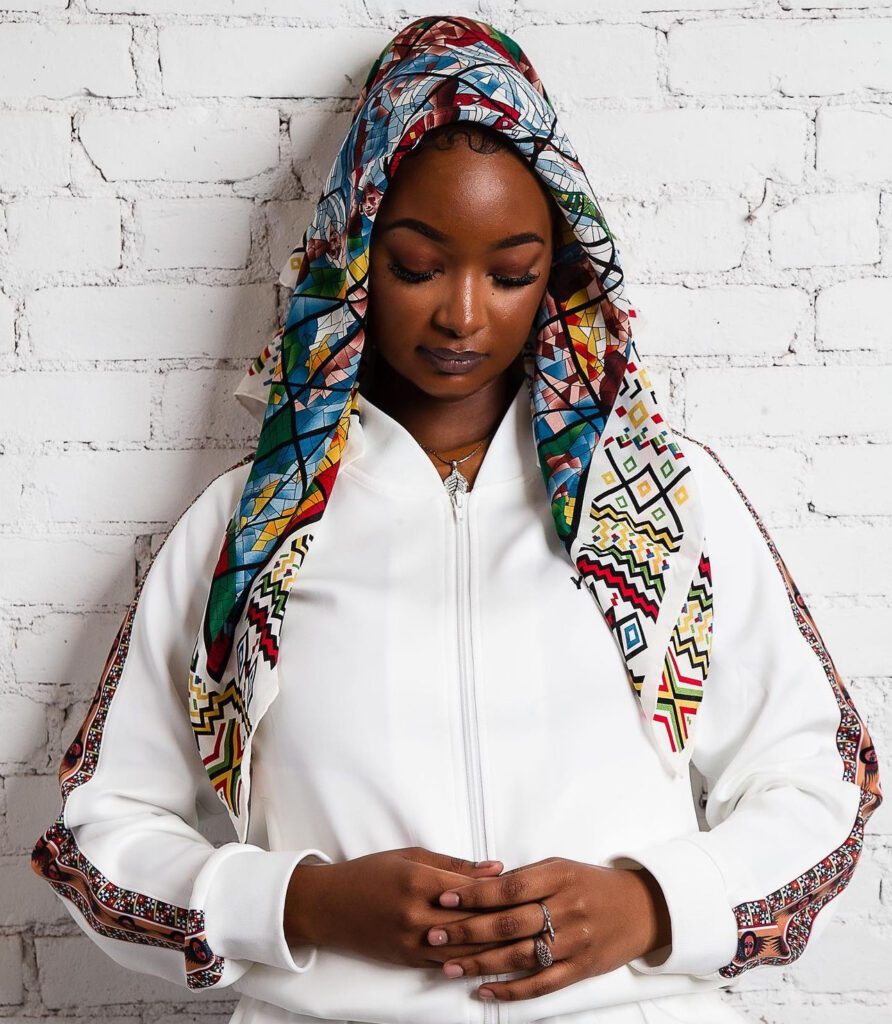
HL: If you could only attend one of the major fashion festivals for the rest of your life, which one would that be?
HA: I’ve never attended the Paris or the Milan one. I have been to New York Fashion Week several times, but I’ve always wanted to attend the Paris one. I’ve always been curious about that one.
HL: Do Americans miss the beauty in African countries?
HA: From an American point of view, there’s a lot of poverty. Therefore, like, they want to depict and only capture that side—which misses out on everything else! You miss out on the creativity. You miss out on the joy. You miss out on everything that really does contribute and make the places what they truly are.
Also, we really have to be conscious of the narratives that we are taught about Africa. Right? When they show the development, when they show all of these positive things, it takes away from the one-sided narrative that is being told. Perhaps we should examine what we’re teaching our young children, our young American children. I opened a store in Tiburon and figured out a way to keep it going through the pandemic. It’s not easy, but we have to because we want people, young people, to know that it is possible to do. For me, it’s all about the perceptions that you are creating.
HL: Why was it important for you to give 20 percent of all your proceeds to fund scholarship and education?
HA: I explained early about my husband not being able to go to school straight through and how I couldn’t attend until the fourth grade. So, we really wanted to make sure that people in that community or kids in that community know that you can a make it out because he’s an example. You can make it out. You can build something successful. You can travel the world. Your opportunities are limitless as long as you don’t put limits on yourself and as long as you’re open and ready. That’s the mindset we want for our kids and a reason why we focus a lot on education and scholarships. It is a way to break out of the cycles of poverty.
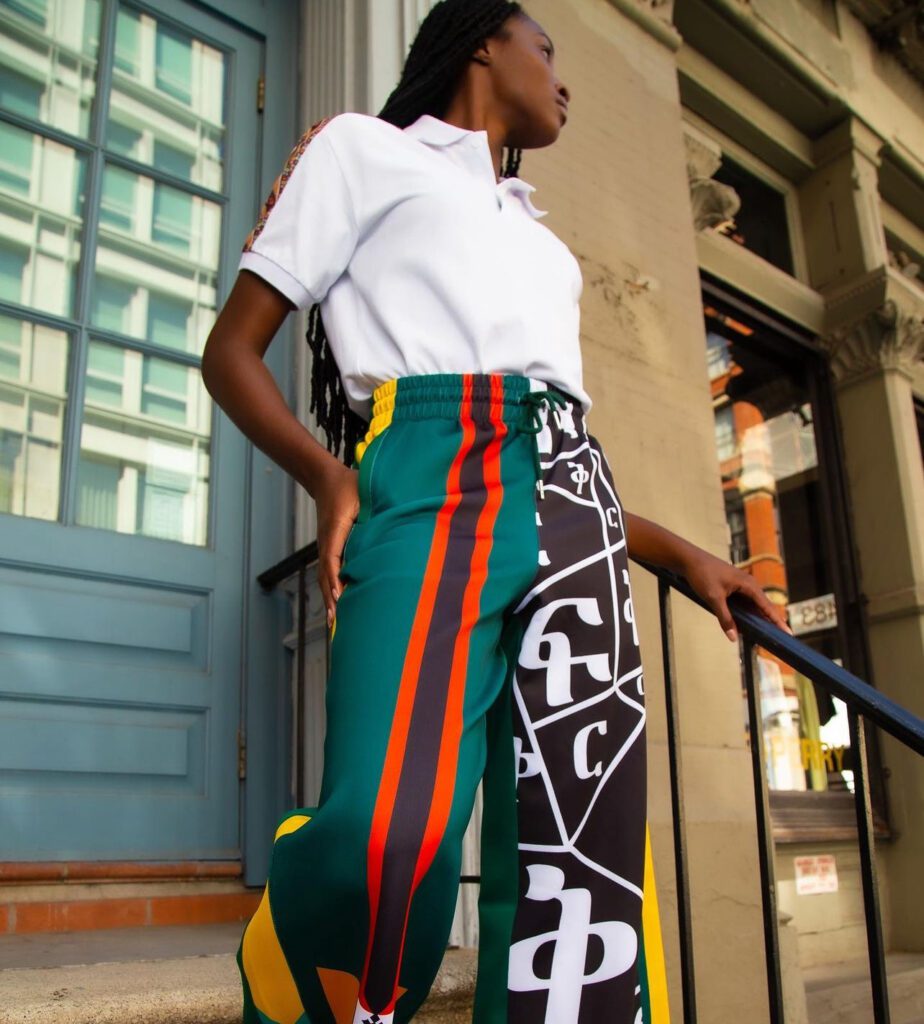
HL: What are the goals for 2024?
HA: Definitely doubling down online. We are looking to get to more people. I feel like our brand is so cool, but still needs to reach more people. We love that Klay Thompson and Carlos Santana support and rock our brand, but we’re looking for ways to amplify and build our brand in the relevant sectors of the world. We will start doing more pop-up kind of arrangements throughout the San Francisco Bay Area and Los Angeles. I’m always thinking on how to bring the brand into different communities so that they can see who we are.
